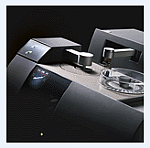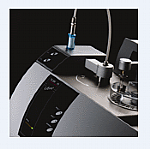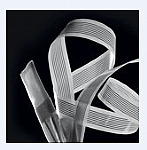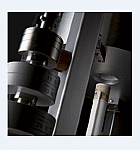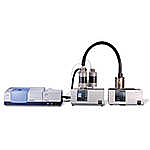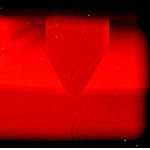- 60,000 contract/tender opportunities per year
- 4 Million UK Companies listed
- 12 million Director Names
- 100 million web pages indexed
NETZSCH-Instruments
Overview
Products
Netzsch Instruments is a leading manufacturer of instruments for thermal analysis, calorimetry, and for the determination of thermophysical properties. We have over 50 years worth of industry experience and technical know-how which enables us to offer a state-of-the-art product portfolio and an excellent service. We guarantee that our solutions will not only meet, but often exceed, your every expectation. We develop high-precision instruments for thermal analysis and thermophysical testing, and also offer first class commercial testing services using our innovative facilities. Our products are typically used for research and quality control in the polymer sector, the chemical industry, and for environmental analysis.
DSC/DTA Method: Differential Scanning Calorimetry - Visit our website
Differential Scanning Calorimetry is the most commonly used thermal analysis technique thanks to its flexible use and explanatory power. Our instruments function according to the heat flow principle and have a three dimensional symmetrical construction with homogeneous heating. To ensure high detection sensitivity and stable, reproducible baselines over the lifecycle of the instrument, our products feature sensors with high calorimetric sensitivity, short time constants and a condensation free sample chamber. This makes our DSC instruments ideal for use in research and academia, materials development and quality control. Needless to say, all our DSC instruments comply with the necessary regulations.
TG method: Thermogravimetry - Visit our website
TGA - Netzsch manufactures state-of-the-art instruments for thermogravimetric analysis and thermogravimetry such as thermobalances. These feature digital balance systems and are vertically constructed for top-loading of the sample. Most of our models are vacuum-tight, and, besides the exact recording of mass changes of atmosphere and temperatures as a function, the c-DTA signal may be calculated as a benchmark for endothermal and exothermal processes. Thermogravimetric analysers can be equipped with heated coupling adapters for gas analysis systems, including QMS and FTIR. As with all Netzsch instruments, our thermobalances comply with all the respective regulations and standards.
DEA method: Dielectric Analysis - Visit our website
Dielectric Analysis (DEA) is a time-proven method of investigating the curing behaviour of thermosetting resin systems, composite materials, adhesives and paints. The advantage of using DEA is that it can be employed not only on a laboratory scale, but also within the process.
For ion conductivity measurements, which are calculated from the dielectric loss factor or its reciprocal value, the ion viscosity, NETZSCH offers single and multi-channel DEA systems which operate in various measurement and frequency ranges with different types of sensors.
ARC method: Accelerating Rate Calorimetry - Visit our website
An Accelerating Rate Calorimeter is a highly versatile chemical reactor that measures the thermal and pressure properties of exothermic chemical reactions. The information it provides helps engineers and scientists identify potential hazards and address any safety and efficiency issues in operational processes.
NETZSCH offers a range of Accelerating Rate Calorimeters covering virtually all measurement requirements. All models can be found on our website with further details and technical specifications.
Evolved Gas Analysis - Visit our website
At Netzsch, we bring more than t30 years of experience in evolved gas analysis. We use the thermal analysis instrument in conjunction with the Quadrupole Mass Spectrometer (QMS) to accurately and precisely detect and analyse evolved gases. For gas transfer we use well-known and well-regarded coupling syst4ems, such as the SKIMMER® Coupling, the capillary coupling for the QMS 403 D Aëolos®, and the GC-MS Coupling. Visit our website where you can learn more about our high quality evolved gas analysis solutions.
Refractory Testing - Visit our website
We utilise several proven methods of refractory testing, including Refractoriness Under Load (RUL), Creep in Compression (CIC), Modulus of Rupture (HMOR), Refractoriness (PCE) and Thermal Conductivity (TCT). All these strength-testing methods comply fully with the relevant standards, including ISO 1893, ISO 3187, ISO 5013, DIN EN 993-7/8/9/12/14/15, DIN 51048, DIN 51053, DIN 51063, DIN 51046, ISO 8894-1, ISO 8894-2 and ASTM C1113. Our experience and reputation for high quality stands out in our refractory testing solutions, which are outlined in greater detail on our website.
Details
Info
| Registration Number: | FC030235 |
| VAT Number: | n/a |
| Registered at Companies House: | 1 July, 1995 (28 years and 10 months ago) |
| No of Employees: | n/a |
| Annual Turnover: | n/a |
| Importers: | |
| Exporters: | |
| Company Type: |
|
Opening Times
| Monday | 09:00 AM - 05:30 PM |
| Tuesday | 09:00 AM - 05:30 PM |
| Wednesday | 09:00 AM - 05:30 PM |
| Thursday | 09:00 AM - 05:30 PM |
| Friday | 09:00 AM - 05:30 PM |
| Saturday | Closed |
| Sunday | Closed |
Questions
Additional Information
Brand & Trade Names
- APTAC® 264 APTAC® 264 is capable of studying exothermic reactions at temperatures from ambient to 500ºC and pressures ranging from vacuum to 140 bar (2,000 psia). As a calorimeter, APTAC® 264 can detect and track exotherms at heat generation rates ranging from 0.04 K/min to 400 K/min.
- ARC® 244 The cost-effective Accelerating Rate Calorimeter 244 (ARC® 244) is designed to safely measure the amount and rate of heat release associated with the processing or storage of chemicals with a sample volume of 0.5 ml to 7 ml. The key features are high performance, safety, usability, and flexibility with data integrity and robustness in a temperature range from ambient to 500°C.
- ARC® 254 This new Accelerating Rate Calorimeter (model ARC® 254), formerly known as TIAX New ARC 5000, is a specialized instrument to help industry operate safely and profitably. Highly versatile, miniature chemical reactor, it measures the thermal and pressure properties of exothermic chemical reactions. The resulting information helps engineers and scientists identify potential hazards and tackle key elements of process optimization and thermal stability.
- DEA 288 Epsilon The multi-functional design of the DEA 288 Epsilon (including furnace or laboratory press) allows for the application of a great variety of different test conditions such as heat, cold, humidity or UV light. This enables the user to easily and conveniently determine the best parameters for processing the material.
- DIL 402 C This highly vacuum-tight, horizontal push rod dilatometer with a measuring system made of Invar, a high-resolution inductive displacement transducer and comprehensive thermostatization offers high precision, reproducibility and long-term stability - the best qualifications for demanding use in research and development.
- DIL 402 CD Expansion measurements at two samples, sample comparisons and differential measurements with a calibration standard are the application fields of the new double and differential dilatometer. A higher sample throughput for routine applications and an easy and fast calibration are the interesting aspects of this new instrument concept.
- DIL 402 E The DIL 402 E dilatometer can be operated up to 2400°C or 2800°C with an optical pyrometer and a graphite furnace. High temperature resistant samples can thereby be studied in glassy carbon sample holders under inert conditions or in a vacuum. Thermocouples may be employed up to 2000°C.
- DIL 402 PC The dilatometer DIL 402 PC is a universally applicable instrument for routine investigations of ceramic, glass, and metal samples, this dilatometer meets all normal requisites regarding resolution, calibratability, precision and sample atmosphere. This is an easy-to-operate, entry-level instrument for materials characterization for in-plant quality control
- DMA 242 E Artemis The robust construction of the DMA 242 E Artemis and the high resolution of the deformation measuring system enable precise measurements on both very rigid and very soft samples. The most varied of deformation types, digital signal filtering, kinetic evaluation and frequency extrapolation make the DMA 242 E Artemis to a real all-rounder.
- DSC 204 F1 Phoenix Very high sensitivity and resolution can be realized with this premium DSC, which also features an automatic sample changer (ASC), temperature modulation (TM-DSC), baseline optimization (BeFlat®), correction of thermal resistance and time constants (DSC-correction), even coupling to QMS and FTIR as well as UV-extension for photo-calorimetry
- DSC 204 HP Phoenix DSC measurements with selectable gas pressure allow additional possibilities for the study of chemical reactions, vaporization processes (ASTM E 1782), adsorption and desorption, and aging studies (ASTM E 1858, ASTM D 6186, ASTM E 2009, ASTM D 5483). The DSC 204 HP Phoenix® is ideally configured for these applications
- DSC 214 Polyma The DSC 214 Polyma delivers a powerful solution for requirements in day-to-day measuring tasks in terms of both hardware and software. It is easy to operate while still providing absolute reliability, making this innovative DSC instrument an ideal tool for the research, development, quality assurance and failure analysis of polymer materials.
- DSC 3500 Sirius The DSC 3500 Sirius combines compactness, robustness and ease-of-use with high detection sensitivity, thus offering optimal conditions for quality assurance and failure analysis in areas such as foods, cosmetics, polymers, technical textiles, and organic and inorganic materials.
- DSC 404 F1 Pegasus® The new NETZSCH DSC 404 F1 Pegasus®, High-Temperature Differential Scanning Calorimeter, allows the determination of specific heat and caloric effects in a broad temperature range with outstanding reliability, best resolution and accuracy. The high vacuum tight design, various furnaces and sensors, easily interchangeable by the user, make the new DSC 404 F1 Pegasus® to an ideal tool for DSC measurements at the highest level for research at universities and development tasks at the industrial sector.
- DSC 404 F3 Pegasus The new DSC 404 F3 Pegasus®, High-Temperature Differential Scanning Calorimeter, offers a high flexibility for all DSC and DTA applications in quality control and product development. Furnaces and DSC/DTA sensors are available for a broad temperature range (-150 ... 2000°C). Numerous upgrade possibilities allow adaption of this cost-effective calorimeter system to sophisticated applications.
- DSC 404 F3 Pegasus® The new DSC 404 F3 Pegasus®, High-Temperature Differential Scanning Calorimeter, offers a high flexibility for all DSC and DTA applications in quality control and product development. Furnaces and DSC/DTA sensors are available for a broad temperature range (-150 ... 2000°C). Numerous upgrade possibilities allow adaption of this cost-effective calorimeter system to sophisticated applications.
- FTIR Coupling Different thermal analysis systems can be combined with a Fourier Transform-Infrared Spectrometer (FTIR), which has proved its efficiency especially in the organic field (instrument for EGA: evolved gas analysis).
- GHP 456 Titan® The GHP 456 Titan® allows determination of the thermal conductivity of insulation materials with outstanding reliability and accuracy. Samples 30 cm x 30 cm and up to 10 cm in thickness can analyzed between -160 and 700°C. Innovative plate materials and temperature sensors, special design features and an improved data acquisition and control systems make the system the new benchmark in the field of insulation testing.
- HFM 436 Lambda With the Heat Flow Meter, HFM 436 Lambda, the thermal conductivity of large-sized, plate-formed insulators is investigated at a fixed or adjustable temperature gradient. The built-in PC – or an externally connected one – delivers the precise measurement data after a short compensation time.
- HMOR 422 The modulus of rupture of refractory ceramics is determined as the amount of force applied to a rectangular test piece of specific dimensions until failure occurs. The available models of the HMOR 422 hot modulus of rupture apparatus are used to measure the failure load as well as bending under load or deformation force.
- LFA 427 Outstanding attributes of the LFA 427 are high precision and reproducibility, short measuring times, variable sample holders and precisely adjustable atmosphere conditions in the application range from -120°C to 2800°C. The LFA 427 is the most powerful LFA system for use in research & development.
- LFA 457 MicroFlash® The LFA 457 MicroFlash® is the most modern product for the determination of the two thermophysical properties, thermal diffusivity and conductivity, in the range from -125°C to 1100°C. Its compact, vacuum-tight construction, automatic sample changer and functional software guarantee the highest effectiveness for challenging materials testing.
- LFA 467 HyperFlash The new LFA 467 HyperFlash features a wide temperature range, very high efficiency (with its sample changer for 16 samples), extremely fast data acquisition rates and an intelligent lens system (ZoomOptics) between the sample and detector.
- MMC 274 Nexus® The MMC 274 Nexus® can be used in conjunction with the DSC and the Accelerating Rate Calorimeter where its special features better match the application. The MMC 274 Nexus® is used for measuring heats of reaction, reaction rates, endotherms, heat capacities, phase changes, gas generation rates and vapor pressures.
- Perseus STA 449 F1/F3 - Coupling The new Perseus STA 449 F1/F3 is an unmatched alliance between two successful instruments: the NETZSCH STA 449 F1/F3 Jupiter® and the ALPHA FT-IR spectrometer by Bruker Optics. Its design is unprecedented and sets a benchmark for state-of-the-art coupling systems.
- Photo-DSC 204 F1 Phoenix® The Photo-DSC 204 F1 Phoenix®, Differential Photocalorimeter, is our answer to the market trend seeking solutions for analyzing the UV curing of light-activated resin systems, adhesives, paints, coatings and dental masses. Further application areas include determining the effect of light on the shelf life of foods or technical oils, fats and lubricants.
- QMS 403 D Aëolos® The QMS 403 D Aëolos® is a very compact mass spectrometer with a heated capillary inlet system, specially designed for routine analysis of volatile decomposition products of thermal analysis (instrument for EGA: evolved gas analysis).
- QMS 403/5 SKIMMER Highest detection sensitivity through direct coupling of the STA 409 CD with a quadrupole mass spectrometer (QMS) - evolved gas analysis (EGA) method.
- RUL/CIC 421 The RUL/CIC Apparatus 421 RUL/CIC 421 enables determination of the deformation point under compression and the creep in compression with one instrument without retrofitting. Furnace, load device, differential measuring system, control and software are designed for reliable, automatic long-term operation.
- STA 449 F1 Jupiter With the introduction of the new STA 449 F1 Jupiter® NETZSCH is setting new standards. Unlimited configuration flexibility and unmatched performance are the foundations for a great variety of application possibilities in the fields of ceramics, metals, plastics, and composites over a broad temperature range (-150...2000°C).
- STA 449 F3 Jupiter® The new STA 449 F3 Jupiter® combines the advantages of a high sensitive thermobalance and a true Differential Scanning Calorimeter. Various furnaces and TG, TGA-DTA and TGA-DSC sensors can be used, whereby the system can be easily optimized for the most versatile applications.
- STA 449 F5 Jupiter® The STA 449 F5 Jupiter® is a truly sophisticated instrument with two true measurement techniques (DSC and TGA), easily expandable capabilities, accessories for evolved gas analysis and a complete software package all for a very attractive price.
- TCT 426 The TCT 426 works according to the hot wire method and is especially designed for the investigation of refractory rock. The measuring cross, parallel wire, and T(R) methods can be used in the instrument. The TCT 426 is indispensable for the efficient use of energy in industrial kiln engineering with refractories.
- TG 209 F1 Libra® Flexibility with the fittings of this premium instrument for thermogravimetry allow it to cover almost any imaginable application in the range up to 1100°C. The new system has many outstanding features: BeFlat® function allows or immediate measurement upon switching on the unit, the system’s heating rates of up to 200 K/min allow for faster results, while its corrosion-resistant ceramic furnace withstands even fluorine- or chlorine-containing polymers, c-DTA® function for the detection of exothermal and endothermal reactions.
- TG 209 F3 Tarsus This easy-to-use thermo-microbalance was developed especially for routine applications in the field of plastics, but also for the chemical industry. It is the ideal starter unit up to 1000°C and, together with the DSC 200 F3 Maia®, represents a cost-effective overall concept.
- TG-GC-MS Coupling NETZSCH, in collaboration with JAS (Joint Analytical Systems), has forged a breakthrough improvement in evolved gas analysis (EGA). What sets the new coupling system apart is the fact that the start of the measurement is event-driven. This enables temperature-correlated detection of the substances released, which in turn allows for direct correlation with mass loss steps.
- TMA 402 F1/F3 Hyperion® What sets the new TMA 402 F1/F3 Hyperion® apart is the modular concept of interchangeable furnaces covering the temperature range from -150°C to 1550°C, which are also compatible with other NETZSCH instruments. A large number of sample holder types and adjustment possibilities are available. The new TMA 402 F1/F3 Hyperion® can be operated with a broad range of force, without added weight, digitally programmable from -3 N to 3 N.
Products & Services
- Calorimeters
- Ceramic Testing
- Chemistry Laboratory Equipment
- Contract Test Laboratories
- Dielectric
- Differential Thermal Analysis Equipment
- Dilatometers
- DMA (Dynamic Mechanical Analyser) Test Equipment
- DSC (Differential Scanning) Calorimeters
- Dynamic Analysis
- Dynamic Analysis Equipment
- Food Temperature Measuring Systems
- Gas Analysis Equipment
- High Pressure Equipment (HP)
- High Temperature Tube Furnaces
- Humidity Analysis Equipment
- ID (Identification) Systems Materials
- Laboratory Instruments
- Laboratory Material Test Equipment
- Laboratory Measuring Systems
- Laboratory Test Equipment
- Laboratory Weighing Systems or Equipment
- Laser Flash Thermal Diffusivity Analysis Equipment
- Low Temperature Test Equipment
- Mass Spectrometers
- Mass Spectrometry Instruments
- Material Analysis
- Material Testing
- Mechanical Dynamic Analysis Equipment
- Metallurgical Analysis Equipment
- Plastics Test Equipment
- Polymer Test Equipment
- Simultaneous Thermal Analysis Equipment
- STA (Simultaneous Thermal Analysis)
- Temperature & Humidity Combined Testing
- Temperature Measuring Instruments
- Temperature Measuring Systems
- Temperature Profiling Systems
- Temperature Test Equipment
- Temperature Testing
- Thermal Analysis
- Thermal Analysis Consultants
- Thermal Analysis Equipment
- Thermal Analysis Test Equipment
- Thermal Conductivity Analysis Equipment
- Thermal Conductivity Meters
- Thermal Expansion Dilatometers
- Thermal Insulation Test Equipment
- Thermal Modelling & Simulation
- Thermal Monitoring
- Thermal Properties Test Equipment
- Thermal Test Equipment
- Thermogravimetric Analysis Equipment
- TMA (Thermomechanical) Analysis Equipment
Gallery
Financial Information
To view more detailed financial information for this company click here.
- Companies beginning with M
- Cast to Form Toolmakers
- Handles
- Vincent Timber Ltd
- S.E (South East) Lettings Ltd
- Speedy Management Services Ltd
- Chrome onto Plastic Plating
- INTERPRO UNION LP
- Columba Europe Ltd
- Create Health & Fitness Development Ltd
- Lloyds Trading (UK) Ltd
- Graveley United Ltd
- Seven Sisters Cycle Company Ltd
- Hydraulic Engineers
- Akram Corporation Ltd
- Emmik Transport Ltd
- Equiniti ICS
- Wall Access Panels
- Sagac Ltd




